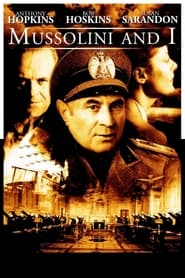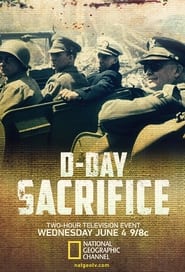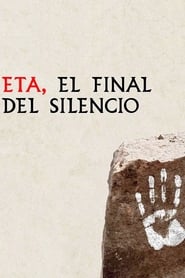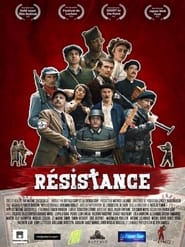Popular War Politics TV Series - Page 80
-
The Second World War in Colour
1999
star 6.4The Second World War In Colour [1999] is a three-part documentary which reveals hours of previously unseen colour film of World War II. As almost all newsreel film was shot in black and white, this DVD offers a completely new portrait of the war. Dramatic colour footage from as early as 1933 shows home movies of Adolf Hitler and his cohorts, the devastation wrought by the Blitzkrieg, life on the home front, D-Day and the Allied invasion of France, British bombers defying German fighters, the horror of the Holocaust that troops met as they entered Germany, and the jubilation of the final Allied victory. With John Thaw's narration intercut with spoken accounts from the letters and diaries of those who fought, those who survived, and those the war claimed as victims, this documentary is an extraordinary remembrance of a monumental time in world history. -
Mussolini and I
1985
Mussolini and I
1985
star 5.3World War II is about to end. Benito Mussolini, il Duce, supreme dictator of Fascist Italy, sees his totalitarian dream crumbling and his power slipping away as the terrible day of his ignominious death at the hands of those he so ruthlessly oppressed for more than two decades draws inexorably near. -
D-Day Sacrifice
2014
D-Day Sacrifice
2014
star 6.9Comprised entirely of re-mastered and colorised archive footage from World War II, much of it never before seen, Sacrifice recounts the story of D-Day through the testimonies of those who lived it. These important historical days are seen through the eyes of French civilians and members of the military fighting on both sides. The testimonies of famous individuals like Dwight D. Eisenhower and Erwin Rommel are intertwined with those of anonymous soldiers and citizens, such as film director Samuel Fuller and Eisenhower's chauffeur, Kay Summersby. From the preparations for D-Day all the way through to the liberation of Paris, the accounts of these men and women provide a moving and invaluable retelling of this pivotal time in history. -
The Inner Circle
2019
The Inner Circle
2019
star 6The day before Almedal Week begins, Minister of Business Affairs David Ehrling receives a call from Prime Minister Elvira Kropp. She explains that she intends to resign and that in connection with a press conference she wants to "point out" David as a possible successor. David will stop at nothing to become Prime Minister. But is it a price worth paying? -
Jackie, Ethel, Joan: Women of Camelot
2001
star 4.1The stories of three women who married into America's royal family, and lived in the glory and the glare of the political spotlight. -
Sverige och kriget
2025
Sverige och kriget
2025
star 5In 2025 it will be 80 years since the end of World War II. What was it like to live in Sweden during the war? How were people affected by everything that happened so close to home? SVT has asked the Swedish people to send in their memories: letters, films, photographs and diaries and several thousand responses were received from all over the country. -
Победа
2025
Победа
2025
-
Dazed are the faces
2017
Dazed are the faces
2017
The Second World War depicted through the eyes of a German platoon on the Eastern Front. -
Враг у ворот
2024
Враг у ворот
2024
-
Abigel
1978
Abigel
1978
The story takes place during World War II. Vitay Georgina is enrolled by her father, General Vitay, in the completely closed, residential Calvinist Matula Girls' Institute in the town of Árkod, on the outskirts of the country. He does not tell Gina why, as her new classmates would accept her, but after she fights with them over a silly game and betrays them, she is ostracised. -
The Empire Files
2015
The Empire Files
2015
star 8From inside history's biggest empire, host Abby Martin records a world shaped by war & inequality, and explores the U.S. Empire, its rise to world hegemony and its impact on people and the planet. -
Snapphanar
2006
Snapphanar
2006
star 5.6Snapphanar is a Swedish miniseries which aired in three parts on Sveriges Television during Christmas 2006, directed by Måns Mårlind and Björn Stein. The historical drama is about the Snapphane peasant rebel movement which fought against the Swedish rule of Scania in the 17th century. The "Snapphanar" was a rebellion people, who fought secretly for Denmark during 1660-1700. The miniseries were criticised by historians due to a perceived lack of historical accuracy. The Scanian nationalist attitudes portrayed in the series did not exist in the 17th century, and the term snapphane, which is used for self-identification in the series, was in fact a derogatory term used by Swedes. -
王昭君
1988
王昭君
1988
-
V tieni vlkov
1972
V tieni vlkov
1972
-
ETA, el final del silencio
2019
star 9On June 7, 1968, ETA assassinates José Pardines, a Guardia Civil officer. On May 3rd, 2018, a communiqué from the terrorist gang announces the dissolution of its structures. Fifty years of terror, fear, pain, truces, negotiations and 826 deaths lie between the two dates. -
Sokhumi
2024
Sokhumi
2024
-
Cefalonia
2005
-
Cuéntame cómo pasó
2017
Cuéntame cómo pasó
2017
star 2The series interspersed the most significant historical events of the southern country with the comings and goings of a family living in the suburbs of Buenos Aires. -
Résistance
2021
Résistance
2021
They love France. They will fight the German invaders with everything they've got - but they haven't got a clue how. Meet the FIFIs.
 Netflix
Netflix
 Amazon Prime Video
Amazon Prime Video
 Apple iTunes
Apple iTunes
 Apple TV Plus
Apple TV Plus
 Disney Plus
Disney Plus
 Google Play Movies
Google Play Movies
 Paramount Plus
Paramount Plus
 Hulu
Hulu
 HBO Max
HBO Max
 YouTube
YouTube
 fuboTV
fuboTV
 Peacock
Peacock
 Peacock Premium
Peacock Premium
 Amazon Video
Amazon Video
 The Roku Channel
The Roku Channel
 AMC+
AMC+
 Kocowa
Kocowa
 Hoopla
Hoopla
 The CW
The CW
 Vudu
Vudu
 Starz
Starz
 Showtime
Showtime
 PBS
PBS
 Pantaflix
Pantaflix
 FXNow
FXNow
 Tubi TV
Tubi TV
 Kanopy
Kanopy
 Comedy Central
Comedy Central
 Crunchyroll
Crunchyroll
 Microsoft Store
Microsoft Store
 Redbox
Redbox
 Sun Nxt
Sun Nxt
 ABC
ABC
 DIRECTV
DIRECTV
 Crackle
Crackle
 Fandor
Fandor
 Plex
Plex



















